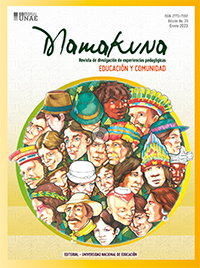Forest school, a learning space in the Chocó Andean and Amazonian Commonwealth
DOI:
https://doi.org/10.70141/mamakuna.20.808Keywords:
Education, methodologies, reflection, evaluation, forest schoolAbstract
The Forest School methodology presents nature and the environment as a biodiverse learning space and a transformative experience for children, youth, and adults. This article collects the systematiza¬tion of the methodology in Ecuadorian educational practices, analyzing its application in the Andean Choco Mancomunidad, the Pachijal and Intillacta Forest Schools located in the province of Pichincha, Metropolitan District of Quito, where teachers and students from the upper basic and secondary education level of municipal education in Quito participated.
In light of the above, taking into account the pedagogical model of the National University of Education (UNAE) and the teacher professionaliza¬tion process in different support centers, with a focus on the Napo-Tena Support Center, the advantages of using Forest Schools with teachers and students from public educational institutions are presented, aiming to achieve positive results in teaching and learning processes, in the natural context provided by the Amazon, within the framework of the flexible curriculum, educational innovation, and the agreement signed between UNAE and the Ministry of Education of Ecuador.
Downloads
References
Alirio, Á., Africano B., Febres, M. y Carrillo, T. (2016). Una aproximación a las pedagogías alternativas. Educere, 20(66),237-247. https://www.redalyc.org/articulo.oa?id=35649692005
Arcos, E. y Torres, O. (2019). Fundación Imaymana, Metodología Bosque Escuela para la Red Bosque Escuela del Chocó Andino. Mashpi-Quito-Ecuador.
Díaz, M. (2006). Metodologías para optimizar el aprendizaje. Segundo objetivo del Espacio Europeo de Educación Superior. Revista Interuniversitaria de Formación del Profesorado, 20(3). https://www.redalyc.org/articulo.oa?id=274/27411311004
Gómez, M. B. y Sacta, O. (2022). La docencia en la Amazonía, ¿una cuestión de profesión o vocación? Educación y Amazonía: Formación, experiencias y relatos de vida. http://repositorio.unae.edu.ec/bitstream/56000/2233/1/Educaci%C3%B3n-y-Amazon%C3%ADa-Formaci%C3%B3n-45-58.pdf
Pérez, A. (2021). La Escuela Bosque como modelo de escuela alternativa: antecedentes, características y repercusión. Revista De Educación Ambiental Y Sostenibilidad, 3(1), 1303. https://doi.org/10.25267/Rev_educ_ambient_sostenibilidad.2021.v3.i1.1303
Mayorga, M. (2013, abril). In Natura. https://escuelainnatura.com/blog/2018/11/09/matematicas-y-lecto-escritura-en-la-naturaleza/
Ministerio de Educación del Ecuador. (2018). Pichincha, Reserva de biósfera, Río Mashpi, Bosque Andino y Cambio Climático, Bosques Escuela, Fundación Imaymana, Mancomunidad Chocó Andino.
Ministerio de Educación. (2016). Currículo Nacional de Educación Obligatoria-CNEO. Quito: SM. Ecuaediciones.
Pereira, A. y Rodríguez, N. (2011). El aula abierta en espacios naturales: Una experiencia en el Bosque Ramón Álvarez. Revista Electrónica Educare, 15(1),211-222. https://www.redalyc.org/articulo.oa?id=194118804017
Salazar, E. y López, Y. (2018). Aula en el Bosque, un programa costarricense de educación ambiental en el bosque tropical: efecto sobre estudiantes y opinión de los docentes. Cuadernos de Investigación UNED, 10(2), 342-352. https://www.redalyc.org/journal/5156/515657704011/html/
Torres, O. (2019). Bosque Escuela Pambiliño. https://www.pambilino.org/
Published
How to Cite
Issue
Section
License
Copyright (c) 2023 Mamakuna

This work is licensed under a Creative Commons Attribution-NonCommercial-ShareAlike 4.0 International License.





